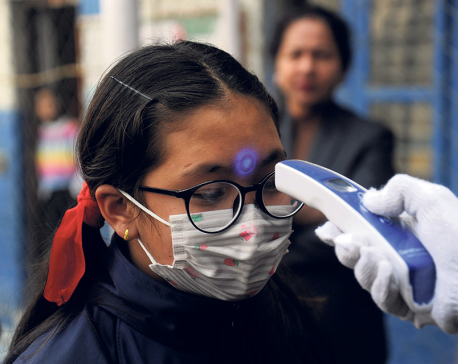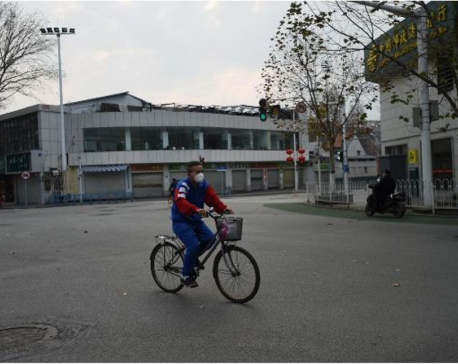
OR
Opinion
Helping Nepali Workers in South Korea amid COVID and Beyond
Published On: August 14, 2021 02:48 PM NPT By: Sona Thadarai | @@sonathadarai


Sona Thadarai
Thadarai is a participant of Dalit Reader’s Writing Workshop, an initiative for academic advocacy on Dalit issues.news@myrepublica.com
More from Author
In South Korea, unlike other countries, employers pay migrant workers equal to Korean workers. On average, per month, Nepali workers earn 1500 to 2200 USD. In 2020, at minimum, their earnings grossed 8590 Won (roughly 7.5 USD) per hour for 40 hours a week. In 2021, the hourly minimum wage has already been increased to 8720 Won. During additional hours and holidays, workers receive even higher wages.
On 22 March 2020, as COVID-19 disrupted international movement, Nepalis expecting to fly to South Korea descended onto the streets of Kathmandu to protest. They urged the government to arrange safe flights to Korea at the earliest, a clear sign of how much Nepali families rely on foreign employment.
Owing to scarce opportunities at home, thousands of unemployed Nepali youths seek work overseas. Many prefer South Korea to Malaysia and the Gulf countries as Korea offers high income. However, for safe and managed migration of Nepalis, both South Korea and Nepal need better plans. Training and awareness programs at home and abroad can guarantee Nepali youths more predictable departures to Korea and better integration after they return to Nepal. Fixing a few shortcomings can uplift the Nepali workers’ livelihoods and Nepal’s economy.
Current migration statistics
"South Korea’s population decline is a major contributing factor to its need for immigration and that need is growing," Foreign Policy magazine highlights in a January 2021 article. Korea cannot meet its domestic labor demands without foreign workers.
Increasingly, Nepalis are migrating to South Korea for employment. In 2007, Nepal and South Korea agreed to send Nepali workers to Korea. At present, roughly 42,000 Nepalis, including 35,000 with work visas, reside in South Korea.
Not all Nepali aspirants secure jobs in South Korea. To be eligible, prospective migrants must pass language and skill tests. They also need to match with the employers. Annually,9,000 Nepalis travel to Korea for work. In 2020, over 90,000 Nepalis applied for language tests. This shows Korea's appeal among the Nepali youths.
Why do Nepalis like Korea?
Syangja's Sushil Aryal,who has been working in Korea since 2012, said, "Honesty, timely payment and equal treatment are what I like the most about Korea." He added, "Surprisingly, Korean company owners not only work together with us but also dine at the same table." Good pay and respect for hard work attracts Nepali workers to Korea.
In South Korea, unlike other countries, employers pay migrant workers equal to Korean workers. On average, per month, Nepali workers earn 1500 to 2200 USD. In 2020, at minimum, their earnings grossed 8590 Won (roughly 7.5 USD) per hour for 40 hours a week. In 2021, the hourly minimum wage has already been increased to 8720 Won. During additional hours and holidays, workers receive even higher wages.
Nepali workers also choose Korea because of the transparent selection process and good employment benefits. In collaboration with Nepal, Korea conducts fair written tests under strict professional supervision. A job entitles Nepalis for health insurance. To motivate employees, many employers pay for food and accommodation.
In addition, female Nepali workers also admire Korea's women-friendly work environment. The Korean government's strict enforcement of safety and security lessens harassment and crime. "In Korea, employers treat female staff with more respect than males. They provide rest days even during menstruation periods," said Sapana Sunuwar of Ramechhap who has worked in a Korean home appliance company for over 30 months.
Problems along the journey
Inevitably, Nepali workers often face challenges in Korea due to cultural differences. Korean food differs from Nepali cuisines in taste and religious significance. Likewise, Nepali youths have trouble learning spoken Korean. Nepalis also struggle to acclimatize themselves to Korea's snowy weather and the "palipali" culture.
While at work, employers often utter "palipali" to promote fast work. "Palipali" means to speed up. It epitomizes Korea's hopes to expand the country's economy and infrastructure. As a consequence, many Nepalis in the agriculture sector complain of tough physical labor, long working hours, and few holidays.
In addition, some Nepali workers undergo mental health problems. Living away from family for an extended period, they suffer from homesickness, anxiety, and sometimes even heart attacks, sleep deaths and suicides. Between 2007 and 2021, 203 Nepalis died in South Korea, including 30 % by suicide. Additionally, a few workers who ignore safety measures at work experience physical discomfort and illness.
Covid's impact
COVID's second wave has stalled Nepalis who hope to work in Korea. Because of travel restrictions, Nepalis set to depart for South Korea face great uncertainty. Language test postponement since March 2020 has kept the aspirants in limbo. These Nepalis yearn for tests and flights to Korea.
"7,000 fresh comers and 3,000 re-comers to Korea are stranded even though they already received confirmation from their employers," says Laxmi Regmi, who has worked for over two years in an agricultural farm in Chungcheong Province of South Korea. "I am hopeful the government might introduce special provisions to ensure their travel."
"Unfortunately, my Nepali brothers and sisters are held back in Nepal even after completing the pre-requirement tests," adds Min BK, who has been working in South Korea for about a decade. "Wasting valuable time in the hope of a job has mentally distressed many fellows."
Recommendations
In addition to helping with COVID, four initiatives can improve Nepali workers’ situation in Korea. First, Nepali institutions should teach prospective workers about Korean food, weather and culture. Second, South Korea-based non-government organizations (NGOs) should partner with government offices to address Nepali workers' mental health problems. For example, they can launch awareness programs via mobile apps. Third, the two governments should implementa a pension system ("kookmin") for Nepali workers.
"While other foreign workers in Korea enjoy pension provisions, Nepal can also lobby to establish one," suggests a Nepali worker in a Korean seaweed company.
Fourth, and the most important, Nepal needs a long-term vision to better integrate workers once at home. Nepal's policies should assimilate Nepalis with overseas work experience into the Nepali labor market to utilize their skills. Programs such as soft loan policies for entrepreneurship, though in the inception phase, can retain skilled workers in Nepal.The government should allocate funds targeted to better incorporate returnees.
In addressing COVID constraints, Nepal's recent decision to operate regular flights, though limited to a few countries, spurs rays of hope. In addition, Nepal also requires practical policies, budget provisions and collaboration with NGOs to properly manage workers in South Korea. And even more vital, lasting strategies are needed to guarantee a secure future of Nepali workers.
You May Like This

Outbound migrant worker numbers down 75% amid COVID-19 fears: Officials
KATHMANDU, March 7: The number of Nepali workers going abroad in search of foreign employment has sharply declined in recent... Read More...

South Korea to launch mass coronavirus testing, U.S. pledges $1 billion for vaccine
SEOUL/BEIJING, Feb 25: South Korea aims to test more than 200,000 members of a church at the center of a surge... Read More...

16 migrant workers in Saudi Arabia running out of food stock
KATHMANDU, Sept 16: Sixteen Nepali migrant workers are running out of food stock in Saudi Arabia after the company they... Read More...




Just In
- CM Kandel requests Finance Minister Pun to put Karnali province in priority in upcoming budget
- Australia reduces TR visa age limit and duration as it implements stricter regulations for foreign students
- Govt aims to surpass Rs 10 trillion GDP mark in next five years
- Govt appoints 77 Liaison Officers for mountain climbing management for spring season
- EC decides to permit public vehicles to operate freely on day of by-election
- Fugitive arrested after 26 years
- Indian Potash Ltd secures contract to bring 30,000 tons of urea within 107 days
- CAN adds four players to squad for T20 series against West Indies 'A'














Leave A Comment